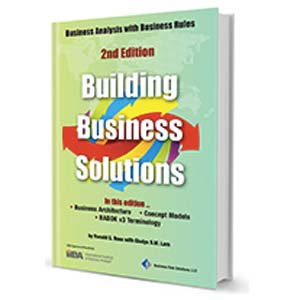Who (or What!) Makes Your Operational Business Decisions?
First, let's be clear what kind of decision I mean. Say "decision" and many business people immediately think strategic decision (e.g., whether to enter some new market), or tactical decision (e.g., which supplier to use for a year-long special project). Those are not the kinds of decision I'm not talking about. I'm not talking about project decisions either.
When IT professionals talk about "decisions" they often mean branch points within the deep systemic logic executed by machines — classic decision points in data processing. I don't mean that either.
Instead, I mean decisions in the day-to-day, minute-to-minute bread-and-butter operations of the business. Some examples of such operational business decisions:
- Whether to give a mortgage to a given applicant.
- What discounts a premium customer will receive on a purchase.
- Which customer gets preference if some product or resource is in short supply.
Your business makes these kinds of decisions hundreds or thousands of times a day — or hour, or minute. These are the kinds of decisions that regulators, auditors, and compliance officers care about. The kind your business partners deem important because they are directly impacted.
Are the decisions high quality? At a major insurance company a thoroughly-competent, highly-experienced business system analyst recently told us: "When we looked hard at business rules currently implemented in existing systems, we found at least 30% were flatly wrong." After a moment's reflection he added, "That's a very conservative estimate; the actual figure was probably much higher."
The organization was just beginning to recognize the magnitude of the problem. And whose problem is it? The analyst said, "IT told us they couldn't solve the problem because it was a business issue not a software issue. And they were absolutely right about that."
We might have thought this case an outlier if we hadn't heard similar estimates from credible sources in many other companies. And we've found the same ourselves.
Not long ago we were asked to conduct an audit of implemented business rules in one area of business for a major North American bank. The results frankly astounded us. We double- and triple-checked. No error.
To conduct the audit, first we harvested 518 business rules from the relevant Policies and Procedures Manual, the printed (and on-line) reference source for loan officers, and expressed them in RuleSpeak®. How many business rules were implemented correctly in their automated system? We found zero — zero! — fully aligned. Some 447 were actually not implemented at all; the remainder just partially aligned.
You wouldn't think it possible but it gets even worse. We found 261 business rules implemented in their system that did not appear anywhere in the Manual. What sort of way of doing business is that?! Who (or what!) is making the decisions?!
To put things in proper context it helps to appreciate the costs associated with maintaining legacy systems not built on business rules. In a recent visit to a very large health care organization, a high-level manager cited the following statistics. They're staggering. He reported it takes their organization:
- 24 person-years per year to maintain a 30-year old monolithic COBOL legacy system.
- 400 person-days over a 4-month period to make changes to business rules of 'moderate' complexity.
The manager admitted sadly, "Truth be told, we work for our legacy systems, not the business."
Beyond these frightening costs the manager also described how a subtle stagnation had crept into the staff's very way of thinking about their business. "Our business leads are so familiar with the limitations of our legacy systems, they don't even consider business innovations they know from experience to be difficult for the system to handle. Sometimes I wonder if they can even think through innovation effectively anymore."
With variations it's a story we hear time and time again. The need for innovation is ever more immediate, but the reality of achieving it ever so distant. Who (or what) is making the decisions is in your organization?!
At BRS, we have dedicated ourselves to pioneering innovative techniques for achieving order-of-magnitude improvements in how businesses literally operate themselves. We offer no silver bullets. It's heavy lifting to put an organization onto a different track with respect to their core knowledge practices.
Is it worth it? Absolutely. When we see control over decisions coming back where they belong — into the hands of business managers — the results are always extremely rewarding.For further information, please visit BRSolutions.com
About our Contributor:
Online Interactive Training Series
In response to a great many requests, Business Rule Solutions now offers at-a-distance learning options. No travel, no backlogs, no hassles. Same great instructors, but with schedules, content and pricing designed to meet the special needs of busy professionals.











How to Define Business Terms in Plain English: A Primer
How to Use DecisionSpeak™ and Question Charts (Q-Charts™)
Decision Tables - A Primer: How to Use TableSpeak™
Tabulation of Lists in RuleSpeak®: A Primer - Using "The Following" Clause
Business Agility Manifesto
Business Rules Manifesto
Business Motivation Model
Decision Vocabulary
[Download]
[Download]
Semantics of Business Vocabulary and Business Rules